Tuesday, November 18th 2008

Corsair Notes 6GB of Memory Significantly Beneficial for Gaming PCs with Core i7
Today, Intel made its newest piece of silicon, the Core i7 series processor official with the introduction of three models based on the newer architecture, and socket. One of the significant feature-additions for Core i7 is the 192-bit wide DDR3 memory bus, meaning that memory modules in groups of three or six can be used to make use of the triple-channel memory controller the processors come with.
For memory vendors, it means selling kits consisting of three or six modules of 1 GB or 2 GB per module, resulting in 3 GB, 6 GB or potentially, a 12 GB kit (consisting of six 2 GB modules). Corsair, on its part, has been advertising the benefits of 4 GB system memory in the recent past, in a bit to sell its 2x 2GB kits. One of the important benefits Corsair noted was, that it benefited today's games. Come Core i7, and Corsair thinks 6 GB of memory would significantly benefit gaming PCs based on the Core i7 processors. The company released a whitepaper, in which gaming performance between Core i7-based systems equipped with 3 GB and 6 GB of memory were compared.
The testbed consisted of a Core i7 965 Extreme Edition running on a ASUS P6T Deluxe, two GeForce GTX 280 cards in SLI, the software running on Windows Vista Ultimate SP1 64-bit, along with Forceware 180.43 beta drivers for the graphics. There were significant increments in the FPS for the in-game benchmark tool of World in Conflict. 6 GB of memory helped Crysis Warhead only by stepping up its minimum FPS a little overall, while providing a 200% boost in minimum FPS for its All the Fury test.With today's games there's always the issue of higher amount of memory benefiting loading times, and the tests didn't deviate from the hypothesis. To show the how demanding today's games have become, there's a chart provided to show the memory load of the games tested. Most range above 2.2 GB, which given the fact that Windows Vista is the OS, would seem infufficient with the OS and its processes among other common processes today's PCs use. Also provided is a consolidated list of games showing to what extant 6 GB of memory helped step-up minimum frame-rate.Without doubt this is Corsair pushing forth the idea of having 6 GB of memory, which may seem high in today's context, but gives you a little idea as to what to expect from having that amount of memory, where performance is critical (for benchmark junkies and the likes).
For memory vendors, it means selling kits consisting of three or six modules of 1 GB or 2 GB per module, resulting in 3 GB, 6 GB or potentially, a 12 GB kit (consisting of six 2 GB modules). Corsair, on its part, has been advertising the benefits of 4 GB system memory in the recent past, in a bit to sell its 2x 2GB kits. One of the important benefits Corsair noted was, that it benefited today's games. Come Core i7, and Corsair thinks 6 GB of memory would significantly benefit gaming PCs based on the Core i7 processors. The company released a whitepaper, in which gaming performance between Core i7-based systems equipped with 3 GB and 6 GB of memory were compared.
The testbed consisted of a Core i7 965 Extreme Edition running on a ASUS P6T Deluxe, two GeForce GTX 280 cards in SLI, the software running on Windows Vista Ultimate SP1 64-bit, along with Forceware 180.43 beta drivers for the graphics. There were significant increments in the FPS for the in-game benchmark tool of World in Conflict. 6 GB of memory helped Crysis Warhead only by stepping up its minimum FPS a little overall, while providing a 200% boost in minimum FPS for its All the Fury test.With today's games there's always the issue of higher amount of memory benefiting loading times, and the tests didn't deviate from the hypothesis. To show the how demanding today's games have become, there's a chart provided to show the memory load of the games tested. Most range above 2.2 GB, which given the fact that Windows Vista is the OS, would seem infufficient with the OS and its processes among other common processes today's PCs use. Also provided is a consolidated list of games showing to what extant 6 GB of memory helped step-up minimum frame-rate.Without doubt this is Corsair pushing forth the idea of having 6 GB of memory, which may seem high in today's context, but gives you a little idea as to what to expect from having that amount of memory, where performance is critical (for benchmark junkies and the likes).
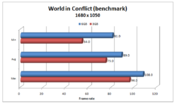
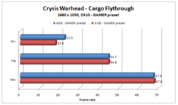
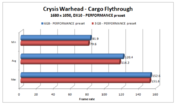
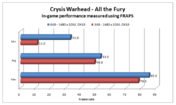
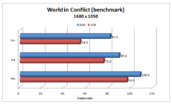
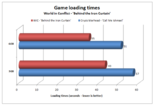
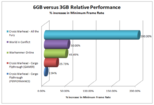
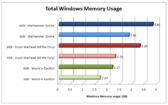
15 Comments on Corsair Notes 6GB of Memory Significantly Beneficial for Gaming PCs with Core i7
1./ The minimum framerate can occur *just once* in an x minute test. It doesnt represent the "feel" of the game in any way
2./ In the Corsair test, they took the WORST framerate over three runs!
3./ The FPS "hit" is usually due to some asset being swapped in/out of memory, whether graphics or sound etc. and doesnt reflect "gamecode speedups"
4./ THEY CHEATED, using the Intel Core i7-965 Extreme Edition CPU. This has a higher QPI bandwidth than the 920 and 940. With the 965 QPI is FASTER than 3 sticks of DDR3 can deliver. But put in 6 sticks and you get better performance. In fact, a comparison check should have been to use 6 sticks of 512MB to have a 3GB system, AND a comparison of results on a 920 system. (But you know why they didnt ;))
5./ The results ARE ONLY VALID on 64-bit Windows. If you are running 32-bit you wont get the gains due to how the memory map works www.microsoft.com/whdc/system/platform/server/PAE/pae_os.mspx
NET NET
For
- For performance look at AVERAGE not minmum FPS
- The corsair results are valid on 64 bit windows only
- The corsair results are valid for 6 sticks on a 965 i7 only
If you are running a 32bit OS, or have a 920 or 940, dont expect the gains shown by Corsair.Significant statistical improvement.
Benchmarks shouldnt use the "once only in the test" minimum framerate, but use a interquartile range, or standard deviation, to get a more representative view on "slowdowns".
Corsair's 2 GB vs 4 GB gaming test
You need to IGNORE those improvements of "minimum framerates" for the reasons explained above.
So what is left:
1./ Task switching is very much improved with a larger memory map due to changes in how much pagefile is needed
2./ Game loading is quicker
3./ Average framerates increase from 0% to 20% max, but average 5-10%, HOWEVER
Remember this: what is happening is that the "mode" average is staying the same, but the "mean" average is higher due to the effect of those minimum frame rates on the average calculation.
Gameplay experience isnt necessarily very different except for the occasional coughs and hiccups of loading assets (graphics and sounds) into memory. It is not as though framerates are always higher. What happens is that there are few dips in FPS and it happens less often. This is an important difference: while gameplay is now smoother (and better) is doesnt mean the PC has now more scope for increasing the resolution or increasing graphics details. The gamecode runtime isnt being executed quicker, its just that there are few stalls in FPS.
Exactly! the only real gaming benefit is fewer low FPS dips, but for the few people (including myself)
who think games feel sluggy with under 35 FPS the lessening or removal of those with higher graphic settings are bless.
The slightly better load times and much better task switching ability doesn't hurt either
If the Core i7 makes much more difference from what i have already is yet to be seen. I'm sure a few members on here will give us some hard facts that we all can believe although not saying that whats in the 1st post is false.
www.vr-zone.com/articles/how-much-ram-do-you-need-for-your-core-i7-gaming-pc-/6211.html
www.tomshardware.com/news/corsair-triple-channel-ddr3,6614.html